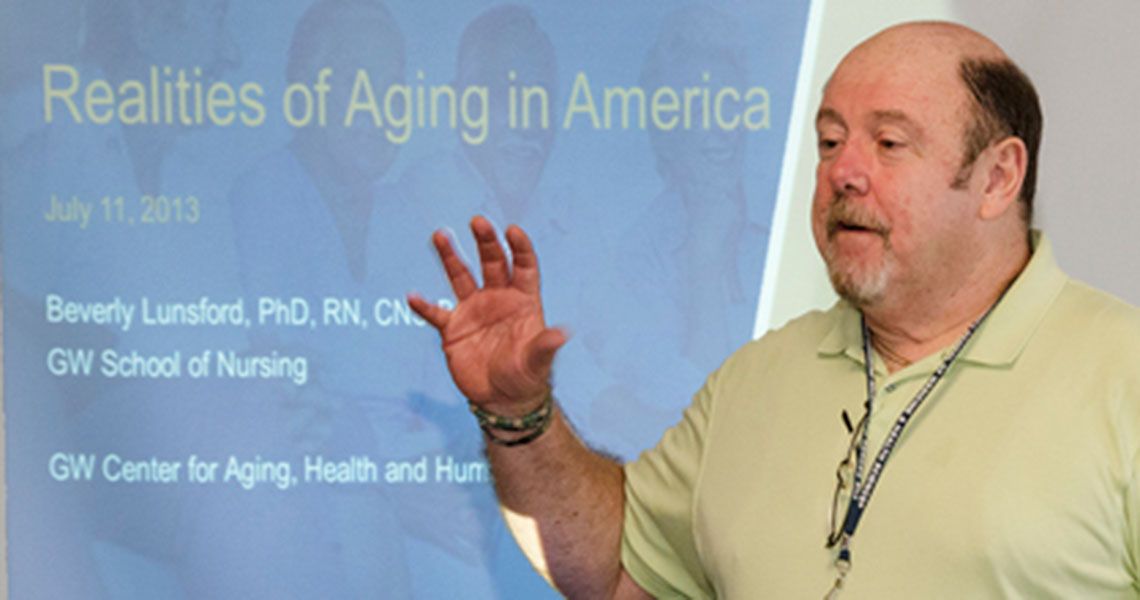Most health care and mental health systems are not prepared to address the growing challenges of the Baby Boom generation. According to Paul Tschudi, Ed.S., M.A., LPC, assistant professor of health sciences programs at the GW School of Medicine and Health Sciences and assistant professor in the Counseling Department at The Graduate School of Education and Human Development, 10,000 Americans turn 65 every day, 43 million Americans are currently caring for someone over the age of 50, and the most caregivers are between ages 50 and 64. “These are startling numbers,” he said. Tschudi gathered 30 members of the GW medical and mental health communities, as well 13 graduate students from GW’s counseling program to discuss and examine the realities of aging in America for the 7th annual Summer Institute on Aging, July 10-13. As the Institute’s founding director, Tschudi created this multi-disciplinary educational program to meet the increasing mental health needs of families and loved ones as they face the journey through loss and life transitions.
The three-day conference, co-sponsored by GW Hospital Women’s Board, Washington Area Geriatric Education Consortium, and the Hospice Foundation of America, featured discussions on aging Veterans, ethics and elder abuse, estate planning and advance directives, how men and women adjust to growing older, the value of creativity and aging, as well as how to be an effective caregiver and coping with a difficult elderly parent.
“What are some of your impressions of older adults, people age 65 and older?” asked keynote speaker Beverly Lunsford, Ph.D, RN, associate research professor at the GW School of Nursing and director of the Washington Area Geriatric Education Center Consortium. The audience responded with issues such as mobility, vulnerability, Alzheimer’s disease, and loss of independence.
Lunsford discussed the epidemiology of aging in the United States, and addressed the health issues faced by older adults. She cited decreasing birth rates and longer life spans as factors that have played a role in the changes of age distribution in the U.S. over the last 50 years. “By 2020, it’s predicted that there will be more people over age 65 than people under age 15,” she said. “It will be the first time in history that has happened.”
“All of these issues indicate the need for mental health professionals to be better equipped to deal with the problems and concerns of our aging population and their caregivers,” said Tschudi.
Lunsford closed her discussion by dispelling myths and stereotypes about getting older. Myth #1: Older people are miserable. “Older people generally focus on the essential, don’t sweat the small stuff, and enjoy their freedoms when their children leave the nest,” she said. Myth #2: DNA is destiny. Lunsford said that leading a healthy lifestyle is as important as having good genes. And finally, myth #3: Older people drain our resources. “Older adults actually provide significant caregiving for children and family members, as well as contribute through volunteer and nonprofit work,” she said.
It’s a fact that memory slows with age, but Lunsford said there is hope — whatever expertise an individual has at age 65 will still exist at age 85. “Older adults don’t lose what they have learned,” she said.
This set the tone for the speakers who followed. All of the speakers brought a message of hope and resiliency to their areas of expertise and encouraged the students to consider focusing their work on older adults.
“Don’t regret growing older,” said Tschudi, “It is a privilege denied to many.”



